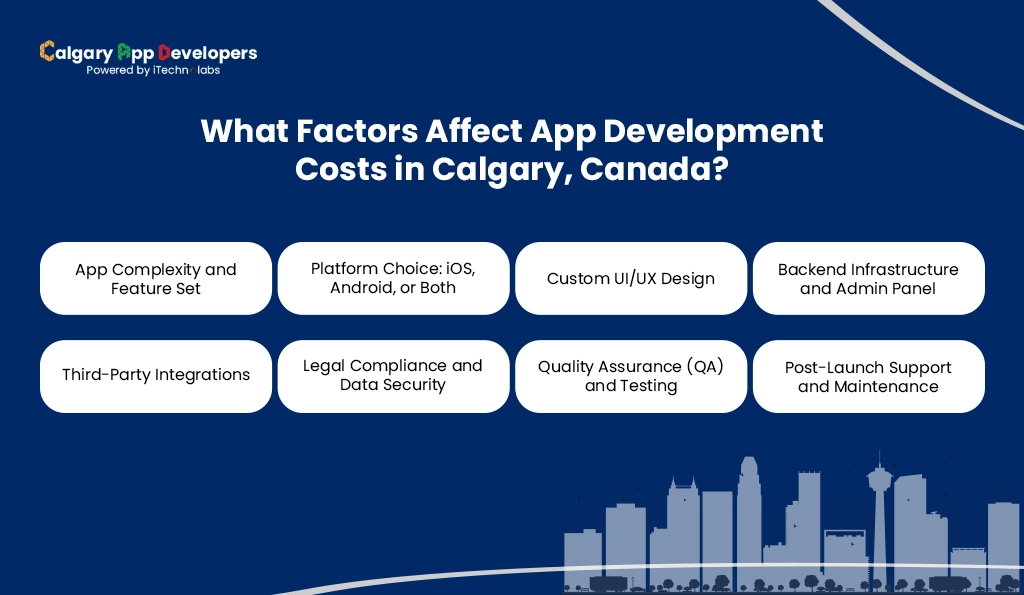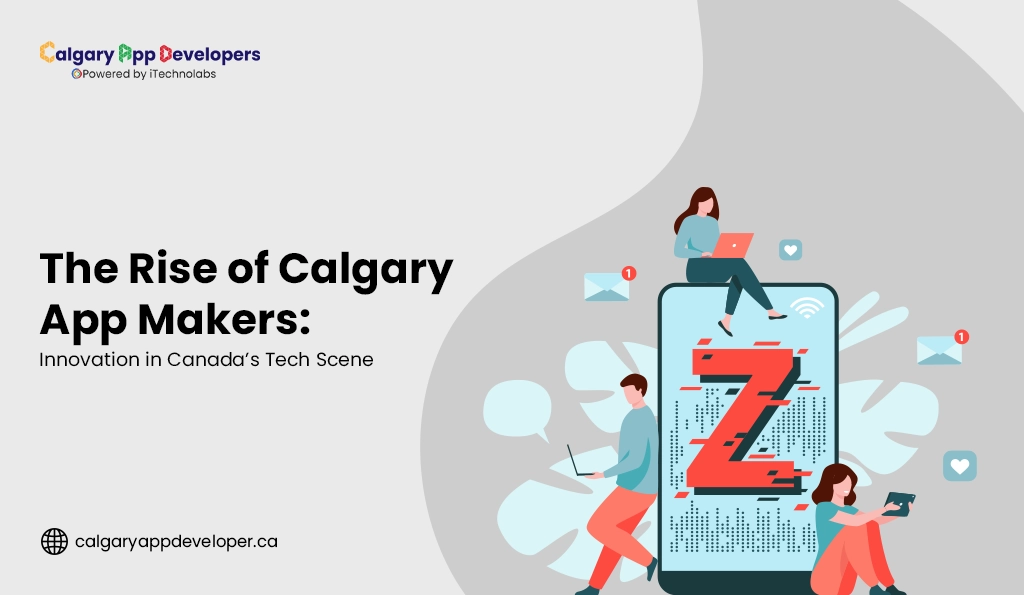How Much Does it Cost to Build an App in Calgary, Canada?

Whether you are an entrepreneur with a business-altering innovation or a business leader who wants to reach more people digitally, creating a mobile app is one of the best investments you can make today. Mobile apps are no longer a nice-to-have—they are a must-have engagement, growth, and competitive tool in almost any industry.
Throughout Canada, the app development industry is on a steep rising trend. Statista projects that the sector will experience enormous growth of 14.97% per year, to a projected value of $57.9 billion USD by 2030. This growth is driven by a growing number of mobile-first companies, smartphone penetration, and a demand for cutting-edge user experiences in various sectors, including retail, healthcare, logistics, and finance.
Canada has some notable tech centers–Toronto, Vancouver, Montreal, and Calgary– all of which have their own unique benefits for organizations looking to create high-quality mobile applications. Toronto, for instance, has gigantic talent pools and investors. Vancouver adds global tech networks and West Coast-style innovation. Montreal adds creative design with robust developer networks. And there’s Calgary—an up-and-coming favorite due to its rapidly expanding tech scene, reduced development costs, and facilitative startup culture.
In this blog, we’ll break down the real costs of building a mobile app in Canada, what factors influence the pricing, and why Canada—especially its key cities—continues to attract global businesses for custom app development.
- Comparing App Development Costs: Calgary vs. Toronto vs. Montreal
- App Development Cost by App Complexity
- Breaking Down the Cost of Building an App in Canada
- What Factors Affect App Development Costs in Calgary, Canada?
- Tips to Reduce the Cost of Developing an App in Calgary
- Case Studies of App Development Cost in Canada:
- Conclusion
- FAQs
Comparing App Development Costs: Calgary vs. Toronto vs. Montreal
When you’re organizing your app development project, location is a big factor in overall expense. All major Canadian cities have skilled developers and high-quality outcomes, but how much you pay can depend drastically on where your team resides.
Here’s a breakdown of typical hourly rates in 2025 across these three cities:
Cost per Hour Rates in Calgary, Toronto & Montreal (2025)
| Role | Calgary (CAD/Hour) | Toronto (CAD/Hour) | Montreal (CAD/Hour) |
| Developer | $80–$100 | $120–$150 | $90–$110 |
| UI/UX Designer | $70–$95 | $90–$120 | $75–$100 |
| QA Tester | $45–$70 | $60–$90 | $50–$75 |
| Project Manager | $75–$95 | $100–$130 | $85–$110 |
| Business Analyst | $70–$90 | $90–$120 | $80–$100 |
| DevOps Engineer | $85–$110 | $110–$140 | $90–$115 |
Note: All hourly rates are approximate and listed in Canadian Dollars (CAD). Actual costs may vary based on the agency, experience level, and project requirements.
Why the Difference?
- Calgary: Known for its rising tech scene and lower living costs, Calgary offers great value for businesses. Local developers often charge slightly less compared to bigger metros while maintaining high-quality standards. It’s a solid option for startups and SMEs looking for affordability and innovation.
- Toronto: As Canada’s largest tech hub, Toronto has access to a wide talent pool but comes with a premium price tag. It’s ideal for large-scale enterprise apps or companies needing specialists in emerging tech like AI or blockchain.
- Montreal: With a strong design and gaming culture, Montreal is often preferred for apps that need creative UI/UX or AR/VR elements. Costs are moderate—more than Calgary, but often slightly less than Toronto for similar work.
Also Check: Cost To Hire Calgary Mobile App Developers (CAD)
App Development Cost by App Complexity
Not all apps are built the same—some are simple tools with just a few screens, while others are complex ecosystems that require months of development. Understanding which category your app falls into helps you estimate your budget more accurately.
Here’s a breakdown of the typical app types and their estimated development costs in Canada (2025):
Estimated App Development Costs by Type (2025, CAD)
| App Type | Description | Estimated Cost | Timeline |
| Basic App | Simple functionality with 3–5 screens, no backend. Example: calculator, checklist. | $15,000–$30,000 | 1.5–3 months |
| Mid-Level App | Includes user login, database, APIs, push notifications, and clean UI/UX. | $30,000–$60,000 | 3–5 months |
| Complex App | Advanced features like real-time chat, payments, admin panel, AI, or multi-platform. | $60,000–$120,000+ | 5–9+ months |
Quick Rule of Thumb: How to Estimate Your App Cost
A simple way to estimate the cost of your app is to use this formula:
App Cost = Total Estimated Hours × Average Hourly Rate (per role)
Let’s walk through an example to make this more practical:
Suppose you’re building a mid-level app with core features such as:
- User login and registration
- A user dashboard
- Payment integration
- A basic admin panel
This type of app typically requires between 450 and 700 development hours.
Now, if you’re working with a development team based in Calgary, where the average blended hourly rate ranges from $80 to $100 CAD, your total estimated cost would fall between:
$36,000 and $70,000 CAD
This calculation is consistent with the mid-level app pricing range mentioned earlier and gives you a reliable ballpark to begin budgeting your project.
Also Read: The Future of Mobile App Development in Western Canada
Breaking Down the Cost of Building an App in Canada
Once you’ve decided on your app development budget—say $40,000, $60,000, or even $80,000—the next logical question is: Where does all that money actually go?
Contrary to popular belief, app development isn’t just about “writing code.” A professionally built app follows a structured process with clearly defined phases—each contributing to the overall quality, performance, and user experience.
Here’s how a typical Canadian app development budget is distributed across the key stages:
Budget Allocation by Development Stage (Canada, 2025)
| Stage | % of Budget | For a $40K Budget | For a $60K Budget | For an $80K Budget |
| Discovery | 10–15% | $4,000–$6,000 | $6,000–$9,000 | $8,000–$12,000 |
| UI/UX Design | 20–25% | $8,000–$10,000 | $12,000–$15,000 | $16,000–$20,000 |
| Development | 40–50% | $16,000–$20,000 | $24,000–$30,000 | $32,000–$40,000 |
| QA & Testing | 15–20% | $6,000–$8,000 | $9,000–$12,000 | $12,000–$16,000 |
| Deployment & Handoff | 5–10% | $2,000–$4,000 | $3,000–$6,000 | $4,000–$8,000 |
Note: These figures are based on pricing trends from agencies and freelance teams across Calgary, Toronto, and Montreal.
What’s Included in Each Stage?
1. Discovery (10–15%)
This is the planning and strategy phase. It includes:
- Identifying core features and user personas
- Technical architecture planning
- Wireframes and user flow diagrams
- Choosing the tech stack
Spending time here ensures your app stays aligned with business goals and prevents costly rework later.
2. UI/UX Design (20–25%)
Designing your app’s look and feel. Key activities include:
- Creating UI layouts and interactive prototypes
- Conducting user feedback cycles
- Preparing design assets for development (e.g., Figma files)
Strong design helps reduce future development and testing costs.
3. Development (40–50%)
This is the core of the project. It covers:
- Front-end and back-end coding
- API integrations and third-party tools
- Building features like login, dashboards, chats, and payments
- Support for multiple platforms (iOS, Android, or both)
This is typically the largest chunk of your budget.
4. QA & Testing (15–20%)
Ensures the app works well across devices and use cases:
- Manual and automated testing
- Performance optimization
- Bug fixing and usability improvements
Thorough QA helps prevent issues that might otherwise frustrate users post-launch.
5. Deployment & Handoff (5–10%)
Finalizing and launching your app includes:
- Publishing to the App Store or Google Play
- Setting up cloud servers or backend services
- Preparing technical documentation
- Providing training and post-launch support
This breakdown provides a transparent view into how your budget is allocated—helping you understand where every dollar goes and why each phase matters.
Must Check: Top App Development Trends in North America
What Factors Affect App Development Costs in Calgary, Canada?

App development is not just about coding—it’s a multi-phase process influenced by a range of variables. Whether you’re working with a tech team in Calgary, Toronto, Montreal, or anywhere in Canada, the final cost of your app depends on how much work is involved, what kind of app you’re building, and what quality benchmarks you aim to meet.
Below are the most important factors that determine how much you’ll pay to develop a custom mobile app in Canada.
1. App Complexity and Feature Set
One of the biggest drivers of cost is the complexity of your app. The more features, user flows, and technical logic your app has, the longer it takes to design, develop, test, and maintain.
- Basic apps like calculators, to-do lists, or local event directories are straightforward and typically cost less because they have limited functionality and minimal backend needs.
- Mid-level apps might include features such as login systems, user dashboards, payment processing, or social sharing. These take more time to build and require secure backend infrastructure.
- Complex apps—such as ride-sharing platforms, delivery apps, social networks, or AI-based tools—require custom logic, data syncing, real-time updates, and extensive testing, all of which raise costs significantly.
2. Platform Choice: iOS, Android, or Both
Choosing which platform(s) to develop for is another major factor:
- Single platform development (either iOS or Android) is more affordable and often chosen by startups or MVPs to keep costs low.
- Native development for both iOS and Android means building and maintaining two separate codebases, which essentially doubles the work and increases the budget.
- Cross-platform development (using frameworks like Flutter or React Native) allows developers to write a single codebase for both platforms. This approach is more budget-friendly but might not suit apps that require advanced native features.
3. Custom UI/UX Design
Design plays a critical role in how users interact with your app—and it affects cost more than many realize.
- Simple UI/UX designs using standard design elements (buttons, tabs, menus) are easier and quicker to build.
- Custom design that includes unique layouts, advanced transitions, animations, or micro-interactions takes significantly more design and development time.
Moreover, apps with multiple user types (e.g., drivers and passengers in a ride app) or complex flows (e.g., multi-step onboarding, dynamic content feeds) require more detailed wireframing and interface work.
4. Backend Infrastructure and Admin Panel
Apps that rely on dynamic data, user accounts, content storage, or real-time updates need a robust backend.
This typically includes:
- Server infrastructure to manage requests and data flow
- Databases to store user information, transactions, or content
- APIs to connect the frontend with the backend
- Admin dashboards to monitor users, manage content, and generate reports
Backend systems take time to architect, develop, and secure, especially for apps handling sensitive data or requiring scalability.
5. Third-Party Integrations
Many apps rely on third-party services for critical functionality. While these tools speed up development, integrating them still takes developer time and effort.
Common integrations include:
- Payment gateways (Stripe, PayPal, Razorpay)
- Location services (Google Maps, Mapbox)
- Authentication (Google/Facebook login)
- Analytics (Firebase, Mixpanel)
- Push notifications, live chat, or cloud file storage
Some integrations are plug-and-play, while others require custom API work, syncing, and thorough testing.
6. Legal Compliance and Data Security
In Canada, apps that collect, store, or process personal data must comply with national and provincial privacy laws.
The most relevant regulations include:
- PIPEDA (Personal Information Protection and Electronic Documents Act) applies to all private-sector apps handling personal information
- HIPAA relevant if your app deals with medical or health data
- CASL governs how apps can send promotional emails, messages, or notifications to users
Ensuring compliance might require:
- Secure logins and encrypted data transmission
- Clear privacy policies and user consent mechanisms
- Admin controls and activity logs
- Ongoing updates to match changing regulations
7. Quality Assurance (QA) and Testing
QA ensures your app is bug-free, user-friendly, and functions as expected on various devices and OS versions.
Testing includes:
- Manual testing (on different devices and screen sizes)
- Automated testing (unit tests, regression tests)
- Usability testing (for navigation and performance)
- Security testing (to prevent vulnerabilities)
The more complex your app, the more testing is required. Apps with payment systems, chat features, or offline functionality need even more robust QA.
8. Post-Launch Support and Maintenance
Your app’s journey doesn’t end with the launch. To stay relevant and functional, you’ll need to budget for:
- Bug fixes and patches
- Performance updates
- Adding new features based on user feedback
- OS compatibility updates (especially with new iOS/Android releases)
- Server monitoring and scaling
Most Canadian agencies and freelancers offer monthly maintenance packages or retainer models for ongoing support.
Read Also: How Mobile App Development Is Evolving in Calgary
Tips to Reduce the Cost of Developing an App in Calgary
App development doesn’t have to break the bank—especially when you make strategic decisions right from the start. Calgary, with its unique combination of affordability and skilled talent, offers one of the most cost-effective environments in Canada. Here’s how you can make the most of your budget without compromising on quality:
1. Choose Calgary as Your Development Base
Hiring app developers in Calgary is significantly more affordable compared to major tech hubs like Toronto or Vancouver. Average hourly rates in Calgary range between $90 and $110, while in Toronto, rates often exceed $130–$150/hour. Calgary’s tech ecosystem has grown rapidly, supported by government grants, a lower cost of living, and a collaborative startup culture—making it a smart location to reduce overhead while still accessing top-tier talent.
2. Prioritize an MVP (Minimum Viable Product)
An MVP allows you to launch faster by focusing only on the essential features your users need to get started. Instead of building every functionality upfront, you start lean—think login, dashboard, and one or two core tools. This reduces both development hours and testing time. Once your MVP is in users’ hands, you can validate your concept and invest in further development based on real feedback.
3. Use Cross-Platform Frameworks
Rather than building separate codebases for iOS and Android, cross-platform frameworks like Flutter or React Native allow developers to write one codebase that works on both platforms. This not only reduces initial build time by 30–40% but also makes future maintenance and updates more cost-efficient. Calgary’s developer pool is highly experienced in cross-platform tools, helping you save without sacrificing performance or UX.
4. SR&ED: Canada’s 35% Secret Weapon
The Scientific Research & Experimental Development (SR&ED) tax incentive is a government program that offers businesses up to 35% back on eligible R&D expenditures, including software development. If your app involves innovative features, unique integrations, or new technical challenges, you may qualify. Partnering with a Calgary agency familiar with SR&ED can help structure your project and documentation to ensure you maximize this refund, significantly reducing your net development cost.
5. Use Pre-Built Components & APIs
Building everything from scratch can be unnecessarily expensive. Instead, smart developers reuse reliable third-party APIs for payments (like Stripe), maps (like Google Maps), chat (like Twilio), and analytics (like Firebase). Many common app features—like user authentication or image uploads—can be handled using open-source or licensed components, saving both time and testing effort while maintaining high standards.
6. Maintain Clear Scope & Communication
Unexpected features, shifting goals, or vague requirements often lead to scope creep, which delays projects and inflates costs. To avoid this, invest time upfront in defining clear goals, user stories, and functional specifications. Calgary-based development teams often adopt agile workflows with regular check-ins, sprint demos, and transparent time tracking—keeping your project on course and within budget.
Also Read: Why Startups in the U.S. Are Hiring Fractional Dev Teams
Case Studies of App Development Cost in Canada:
To give you a clearer idea of how app development costs work in the real world, here are two case studies from projects we’ve successfully delivered. Both were built using cross-platform technologies like Flutter, allowing us to streamline development and deliver fully functional apps for iOS and Android from a single codebase.
Case Study 1: Fintech Expense Tracking App
Client Need: A secure cross-platform app to help users track income and expenses, set budgets, and view real-time financial insights with bank-level security.
Key Features:
- User onboarding & multi-factor authentication
- Bank account integration (via Plaid API)
- Categorized expense tracking
- Budget planner & monthly reports
- Data encryption & biometric login
- Admin dashboard for analytics
Cost Breakdown
| Development Phase | Hours | Avg Rate (CAD) | Cost (CAD) |
| Discovery & Planning | 60 | $95 | $5,700 |
| UI/UX Design | 90 | $85 | $7,650 |
| Frontend & Backend Dev | 500 | $100 | $50,000 |
| QA & Testing | 100 | $60 | $6,000 |
| Project Management (25%) | — | — | $17,838 |
| Total Project Cost | — | — | $87,188 CAD |
Timeline: 14 weeks
Tech Stack: Flutter, Firebase, Plaid API, Google Cloud
Case Study 2: Home Services Booking App
Client Need: A marketplace platform where users can book plumbers, electricians, cleaners, and more with real-time availability, ratings, and payment integration.
Key Features:
- User & provider sign-up/login
- Service listings with filters
- Instant booking with calendar sync
- In-app payments and invoicing
- Real-time chat between users and service providers
- Admin panel for service management
Cost Breakdown
| Development Phase | Hours | Avg Rate (CAD) | Cost (CAD) |
| Discovery & Planning | 40 | $90 | $3,600 |
| UI/UX Design | 80 | $80 | $6,400 |
| Frontend & Backend Dev | 420 | $95 | $39,900 |
| QA & Testing | 80 | $60 | $4,800 |
| Project Management (25%) | — | — | $13,675 |
| Total Project Cost | — | — | $68,375 CAD |
Timeline: 12 weeks
Tech Stack: Flutter, Firebase, Stripe API, Node.js, Twilio for chat
Conclusion
Building a mobile app in Canada—whether in Calgary, Toronto, or Montreal—can be a smart investment when planned strategically. As we’ve seen, app development costs vary based on complexity, features, platforms, and team expertise. With average hourly rates and transparent processes, cities like Calgary offer a balance of affordability and top-tier quality, especially for cross-platform development. Whether you’re creating a fintech tool or a home service platform, understanding where your budget goes empowers smarter decisions. From discovery to deployment, every phase adds value when executed thoughtfully. If you’re ready to turn your app idea into reality, connect with a trusted Canadian app development team to explore tailored solutions that align with your goals and budget.
FAQs
1. How much does it cost to hire an app developer in Calgary?
Hiring an app developer in Calgary typically costs $90–$110 CAD per hour, depending on experience and the project scope. Calgary offers excellent value with top-tier talent at more affordable rates than cities like Toronto. For startups or SMEs, hiring a Calgary-based team can be a cost-effective yet high-quality option.
2. Is app development cheaper in Montreal?
Yes, Montreal tends to offer slightly lower development costs—developer rates range from $90 to $110/hour, versus $120–$150/hour in Toronto. However, Calgary remains the most cost-effective major tech hub for app development in Canada, offering competitive pricing, skilled teams, and growing startup support.
3. Can I get a full app built for under $50,000 CAD?
Absolutely—if you’re building a basic to mid-level cross-platform app with limited features, you can launch within a $40,000–$50,000 CAD budget. Keeping the scope focused, using pre-built components, and working with an experienced Calgary-based team can help reduce costs without sacrificing quality.
4. What’s included in a $100K custom app?
A $100K budget typically covers the full development lifecycle: discovery, UI/UX design, frontend/backend development, QA testing, and deployment. This range usually applies to mid-to-high complexity apps—think real-time features, secure payments, custom dashboards, and admin panels. It often includes project management and post-launch support too.
5. Do Canadian developers charge less than U.S. developers?
Yes, Canadian developers often charge 15–30% less than their U.S. counterparts, largely due to currency differences and lower overheads. Despite the cost advantage, Canadian teams maintain high quality and are known for strong technical standards, making them a popular choice for U.S. and international clients.
6. How long does it take to build a mobile app in Canada?
On average, app development in Canada takes 3–6 months, depending on complexity. A basic MVP might take 8–10 weeks, while a full-featured app could extend to 6+ months. Timelines include planning, design, development, testing, and deployment—longer if you’re building for multiple platforms or adding advanced features.
7. Do I need to localize my app for Quebec?
Yes, if your app targets users in Quebec, especially for public or consumer-facing platforms, you’ll likely need French localization to comply with provincial language laws (like Bill 96). This includes translating the UI, notifications, and legal content to French for proper market accessibility and compliance.
8. Can I get tax credits back if I hire an agency?
Yes! Businesses in Canada may qualify for SR&ED (Scientific Research and Experimental Development) tax credits and provincial incentives like Alberta’s Interactive Digital Media Tax Credit. Hiring a Canadian agency, especially one based in Calgary or Quebec, can make you eligible for these rebates—sometimes recovering up to 40% of dev costs.

Pankaj Arora
Founder, Calgary App Developers
Pankaj Arora is a seasoned technology leader and the Founder of Calgary App Developers, with 7+ years of expertise in crafting high-performance digital solutions. His core competencies include full-stack app development, cloud-native architecture, API integration, and agile product delivery. Under his leadership, Calgary App Developers has empowered startups and enterprises alike with scalable mobile applications, secure web platforms, and AI-driven SaaS products.






